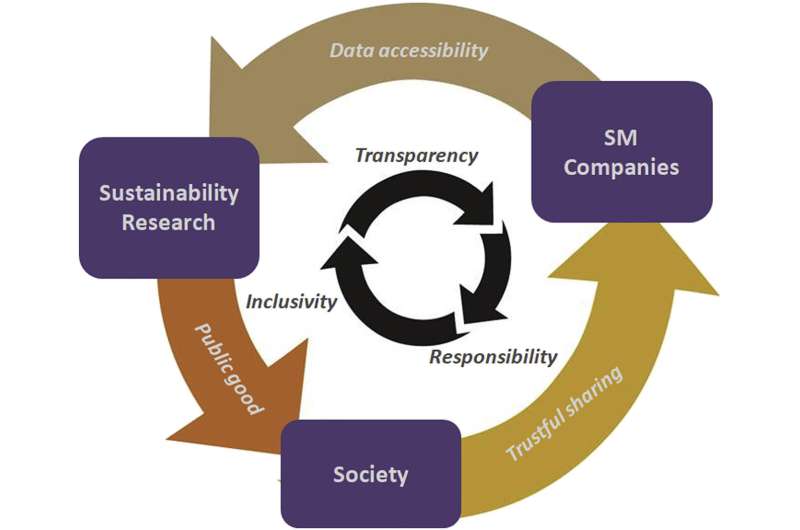Study shows social media content opens new frontiers for sustainability science researchers

With more than half of the world's population active on social media networks, user-generated data has proved to be fertile ground for social scientists who study attitudes about the environment and sustainability.
But several challenges threaten the success of what's known as social media data science. The primary concern, according to a new study from an international research team, is limited access to data resulting from restrictive terms of service, shutdown of platforms, data manipulation, censorship and regulations.
The study, published in the journal One Earth, is the first known to evaluate the scope of environmental social media research and its potential to transform sustainability science. The 17-member research team analyzed 415 studies, published between 2011 and 2021, that examined social media content related to the environment.
"Ideas about climate change and our environment are increasingly coming from social media," said Derek Van Berkel, assistant professor at the University of Michigan's School for Environment and Sustainability and one of the study' three lead authors. "Online communities like Reddit, or simply news stories shared by your friends on Facebook, have become digital landscapes where many ideas are shaped and formed."
Understanding how those ideas are shaped aids science communicators in honing environmental messaging and prompts them to fill gaps where information is lacking or misrepresented.
Despite the potential public benefits of social media data science, the authors argue, current business models of social media platforms have generated a vicious cycle in which user data is treated as a private asset that can be purchased or sold for profit. This has raised public concern and mistrust of social media companies, leading to a greater demand for more regulation.
The study supports the idea of replacing this vicious cycle with a "virtuous cycle."
"A virtuous cycle requires the collaboration of SM companies, researchers, and the public," said co-lead study author Johannes Langemeyer from the Institute of Environmental Science and Technology at the Autonomous University of Barcelona.
"For their part, sustainability researchers can foster more trust and cooperation by embracing high ethical standards. Inclusivity, transparency, privacy protection, and responsible use of the data are key requirements—and will lead to an improved standardization of research practices moving forward," Langemeyer said.
A promising example of cooperation from a social media platform was initiated in January 2021 when Twitter set a new standard for broader access to researchers by introducing a new academic research product track, which for the first time allowed free full-archive searches for approved researchers.
Such an approach could have served as a model for wider open access across social media platforms. But confirming the fears of researchers, Twitter recently announced that as of Feb. 9, 2023, the company will no longer support free access.
"SM data has the potential to usher in a revolution in the current practices of sustainability research, especially in the social sciences, with an impact on par with that of Earth observation in the environmental sciences," said co-lead study author Andrea Ghermandi from the Department of Natural Resources and Environmental Management at the University of Haifa in Israel.
The study concludes that social media data assessments can support the 2015 U.N. Sustainable Development Goals that serve as a universal call to action to end poverty, protect the planet, and ensure that by 2030 all people enjoy peace and prosperity.
"Achieving the U.N. Sustainable Development Goals will require large-scale, multi-country efforts as well as granular data for tailoring sustainability efforts," the study authors wrote.
"The shared values and goals of working for a sustainable future may provide common ground for the cooperation needed to fully realize the contribution that SM data offers."
More information: Andrea Ghermandi et al, Social media data for environmental sustainability: A critical review of opportunities, threats, and ethical use, One Earth (2023). DOI: 10.1016/j.oneear.2023.02.008
Journal information: One Earth
Provided by University of Michigan Should you pay for Meta's and Twitter's verified identity subscriptions? A social media researcher explains
Are Influencers the Key to Fighting Climate Change?

No comments:
Post a Comment